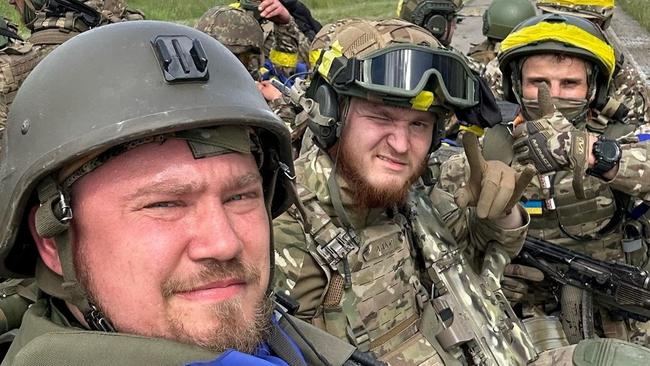Ukraine war: Russia still battling rebels after border incursion
Russian forces are still fighting for control of parts of the border region of Belgorod, the region’s governor has said.

Russian forces are still fighting for control of parts of the border region of Belgorod, the region’s governor has said, warning residents of a handful of border villages not to return to their houses the day after authorities there blamed Ukraine for the war’s largest incursion into Russian territory.
Belgorod Governor Vyacheslav Gladkov warned residents not to panic, after some border areas had been evacuated the previous day, but said Russia’s military was still concluding what President Vladimir Putin labelled an anti-terrorist operation to push the combatants out of Russia.
On Tuesday (Wednesday AEST), Russia’s Defence Ministry said forces had encircled the fighters and destroyed the group, without giving more details. The ministry said it killed 70 people in the operation. The information couldn’t be independently confirmed.
“The clean-up operation by the Defence Ministry and security structures is continuing,” Mr Gladkov said in a video on his Telegram channel. “Right now it’s not worth returning to your houses.”
Ukraine’s military intelligence directorate, known as HUR, identified the troops as two volunteer groups of Russian citizens who work closely with HUR and said the incident was a consequence of the Kremlin’s invasion of Ukraine.
Russian military correspondents said battles were continuing well into the afternoon on Tuesday, with Russian forces trying to stop two units of combatant reinforcements from joining up with the groups inside Russia.
The Russian Defence Ministry said it had launched attacks against the combatants using artillery and air power. Defence Ministry spokesman Igor Konashenkov said the groups had been encircled and at least 70 members had been killed.
The extent of the original incursion and the affiliations of the combatants couldn’t be confirmed independently, but the incident has exposed embarrassing weaknesses around Russia’s border areas as Moscow’s troops prepare for an expected Ukrainian offensive.
“Russia is facing an increasingly serious multi-domain security threat in its border regions, with losses of combat aircraft, improvised explosive device attacks on rail lines, and now direct partisan action,” the British Defence Ministry said in a statement.
One of the Russian groups that has claimed responsibility for the incursion, the Freedom of Russia Legion, said it was continuing to fight inside Russia, without giving details about its location or the status on the battlefield. The group said its actions were destroying the myth of Russia’s military power.
“The Russian army was not able to withstand the group of patriots and volunteers, who have taken up arms and are not afraid to openly go against Moscow’s regime,” the group said on Telegram.
Kremlin spokesman Dmitry Peskov declined to give details of the operation in a daily briefing with journalists but said those who had entered Russia were Ukrainians of Russian ethnicity. He also said there were no plans to hold an emergency session of the Russian Security Council to discuss the incursion.
Some military analysts have said that Ukraine would benefit from cross-border operations in the short term, drawing troops away from front-line positions ahead of Ukraine’s planned offensive. Russia’s fragile front lines allowed for some of the biggest Ukrainian gains during a Kyiv offensive late last year around northeastern Ukraine.
However, one of Ukraine’s biggest advantages on the battlefield up to this point has been low motivation among Russian troops, the majority of whom are fighting for money as contract soldiers, volunteer battalions or in various private military companies. It was unclear how the spread of violence onto Russian territory, where the US has advised Ukraine not to strike, could change that calculus.
Greater attacks on Russian territory could also boost support for Moscow in some quarters, such as China, that have refrained from sending important lethal aid to Mr Putin.
Russian Security Council secretary Nikolai Patrushev held planned talks with Chen Wenqing, Beijing’s top intelligence officer, ahead of Prime Minister Mikhail Mishustin’s trip to China on Wednesday, where analysts said Russia was expected to make a case for greater support.
“Amidst this chaos, Moscow can be expected to ratchet up the pressure on Beijing, seeking direct military support, especially in the light of the impending Ukrainian counteroffensive,” said Velina Tchakarova, founder of an Austrian-based geopolitical consulting firm.
Meanwhile, Ukrainian officials said Kyiv’s forces were still clinging on to a small patch of territory inside the city of Bakhmut, in eastern Ukraine. Moscow claimed to have captured the city earlier this week.
“In the city of Bakhmut, the fighting has subsided, the enemy continues to clear the areas under his control,” Hanna Maliar, Ukraine’s Deputy Defence Minister, said.
She said that on the outskirts of Bakhmut, Ukrainian forces were still pushing forward. The advances signal that it is unlikely Russian troops will be able to advance beyond Bakhmut. There are also questions about how Moscow will hold the city, with Yevgeny Prigozhin, the paramilitary Wagner Group’s founder, saying he would pull his troops out of Bakhmut by June.
The Wall Street Journal



To join the conversation, please log in. Don't have an account? Register
Join the conversation, you are commenting as Logout